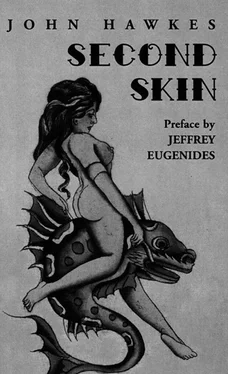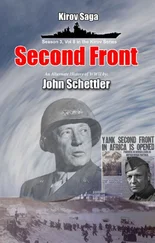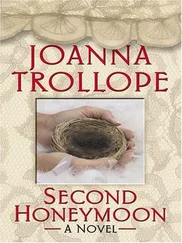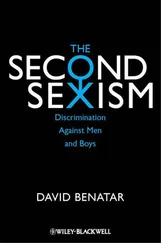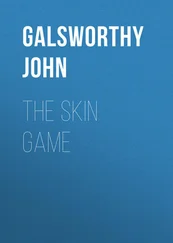And so I was awake, dressed, was free in this sleeping house and had forgotten the signs — the black brassiere, the naked woman, the full case of Old Grand-Dad — and I could think of nothing but the wind and the shore and a set of black oilskins,cracked sou’wester and long black coat, which I had seen in an entryway off the kitchen. Back down I went to the kitchen and yanked open the door, dressed myself swiftly in the sardine captain’s outfit and was shocked to find a lipstick in the pocket. Carefully I let myself out into the first white smears and streaks of that approaching day.
I tried to catch my breath, I socked my hands into the rising and flapping skirts of the coat, I smiled in a sudden flurry of little tears like diamonds, thinking of Cassandra safe through winter days and of a game of Mah Jongg through all the winter nights, and put down my head and made off for the distinct sound of crashing water. From the very first I walked with my light and swinging step and my chin high, walked away from the house ready to meet all my island world, walked actually with a bounce despite the wind, the crazy interference of the black rubber coat, the weight of my poor cold slobbering white navy shoes drenched in a crunchy puddle which I failed to see behind the kennel of the sleeping Labradors. The larch trees with their broken backs, the enormous black sky streaked with fistfuls of congealed fat, the abandoned Poor House that looked like a barn, the great brown dripping box of the Lutheran church bereft of sour souls, bereft of the hymn singers with poke bonnets and sunken and accusing horse faces and dreary choruses, a few weather-beaten cottages unlighted and tight to the dawn and filled, I could see at a glance, with the marvelous dry morality of calico and beans and lard, and then a privy, a blackened pile of tin cans, and even a rooster, a single live rooster strutting in a patch of weeds and losing his broken feathers, clutching his wattles, every moment or two trying to crow into the wind, trying to grub up the head of a worm with one of his snubbed-off claws, cankerous little bloodshot rooster pecking away at the dawn in the empty yard of some dead fisherman. … Oh, it was all spread before me and all mine, this strange island of bitter wind and blighted blueberries and empty nests.
I took deep breaths, battling the stupid coat, and I swung down a path of wet nettles, breathed it all in. Breathed in the salt, the scent of frozen weeds, the briny female odor of ripe periwinkles, the stench from the heads of blue-eyed decapitated fish. And the pine trees. The pine trees were bleeding, freely giving off that rich green fragrance which as a child I had but faintly smelled in the mortuary on Christmas mornings. Just ahead of me, just beyond the growths of crippled pine and still in darkness lay the shore, the erupted coast, and suddenly I the only-born, the happy stranger, the one man awake and walking this pitch-black seminal dawn — suddenly I wanted to fling out my arms and sweep together secret cove and Crooked Finger Rock and family burial mounds of poor fishermen, sweep it all together and give it life, my life. Pitching through brier patches, laughing and stumbling under the dripping pines, I hurried on.
And wet, rubbery, exuberant, I emerged into a clearing and stopped short, opened my eyes wide. I saw only a listing handmade jetty and a fisherman’s hut with boarded-up windows, a staved-in dory and a tin chimney that gave off a thin stream of smoke. But beside the dory — gray ribs, rusted oarlock — there was a boy’s bicycle propped upside down with its front wheel missing and a clot of black seaweed caught in the sprocket. And though there were days and days to pass before I met the boy— his name was Bub — and met also his fishing father and no-good brother — Captain Red and Jomo — still I felt that I knew the place and had seen that bicycle racing in my own dreams. I could only stop and stare at the useless bicycle and at two squat gasoline pumps pimpled with the droppings of departed gulls and wet with the cold mist, those two pumps once bearing the insignia of some mainland oil company but standing now before the hut and sagging jetty as ludicrous signs of the bold and careless enterprise of that outpost beside the sea. I knew intuidvely that I had stumbled upon the crafty makeshift world of another widower. But how could I know that Captain Red’s boat, the Peter Poor , lay invisible and waiting only fifty yards from shore in its dark anchorage? How could I know that we, Cassandra and I, would sail away for our sickening afternoon on that very boat, the Peter Poor , how know about the violence of that sea or about the old man’s naked passion? But if I had known, if I had seen it all in my glimpse of Jomo’s pumps and Bub’s useless bicycle and the old man’s smoke, would I have faltered, turned back, fled in some other direction? No. I think not. Surely I would have been too proud, too innocent, too trusting to turn back in another direction.
So I was careful to make no noise, careful not to disturb this first intact and impoverished and somehow illicit vision of the widower’s overgrown outstation in the collapsing dawn, and staring at bleached slabs of porous wood and rusted nailheads I restrained my impulse to cup hands against the wind and cry out a cheery hello. And I merely waved to no one at all, expecting no wave in return, and gathered my rubber skirts and swept down the path to the beach.
Overhead the dawn was beginning to possess the sky, squadrons of gray geese lumbered through the blackness, and I was walking on pebbles, balancing and rolling forward on the ocean’s cast-up marbles, or wet and cold was struggling across stray balustrades of shale. At my shoulder was the hump of the shore itself — tree roots, hollows of pubic moss, dead violets — underfoot the beach — tricky curvatures of stone, slush of ground shells, waterspouts, sudden clefts and crevices, pools that reflected bright eyes, big smile, foolish hat. Far in the distance I could see the cold white thumb of the condemned lighthouse.
But time, the white monster, had already gripped this edge of the island in two bright claws, had already begun to haul itself out of an ugly sea, and the undeniable day was upon me. I slipped, the coat blew wide, and for some reason I fell back and found myself staring up at a gray sky, gray scudding clouds, a thick palpable reality of air in which only the barometer and a few weak signals of distress could survive. An inhuman daytime sky. And directly overhead I saw the bird, the gray-brown hungry body and crescent wings. He was hovering and I could see the irritable way he fended off the wind and maintained his position and I knew that he would return again and again to this same spot. And against the chopping and spilling of the black water I saw the lighthouse. It was not safely in the distance as I had thought, but was upon me. Black missing tooth for a door, faint sea-discolorations rising the height of the white tower, broken glass in its empty head, a bit of white cloth caught up in the broken glass and waving, the whole condemned weight of it was there within shouting distance despite the wind and sea. I could even make out the tufts of high grass bent and beating against its base, and even through the black doorless entrance way I could feel the rank skin-prickling texture of the darkness packed inside that forbidden white tower, and must have known even then that I could not escape the lighthouse, could do nothing to prevent my having at last to enter that wind-whistling place and having to feel my way to the topmost iron rung of its abandoned stair.
Hovering bird, hollow head of the lighthouse, a sudden strip of white sand between myself and the mud-colored base rock of the lighthouse, little sharp black boulders spaced together closely and evenly in the sand, and then as white as a starfish and inert, naked, caught amongst the boulders, I saw a woman lying midway between myself and the high rock. Vision from the widow’s photography magazine. Woman who might have leapt from the lighthouse or rolled up only moments before on the tide. She was there, out there, triangulated by the hard cold points of the day, and it was she, not I, who was drawing down the eye of the bird and even while the thought came to me— princess, poor princess and her tower — I looked up at the bird, still hovering, and then turned to the strip of beach and ran forward. But I stopped. Stopped, shuddered, shut my eyes. Because of the voice.
Читать дальше
